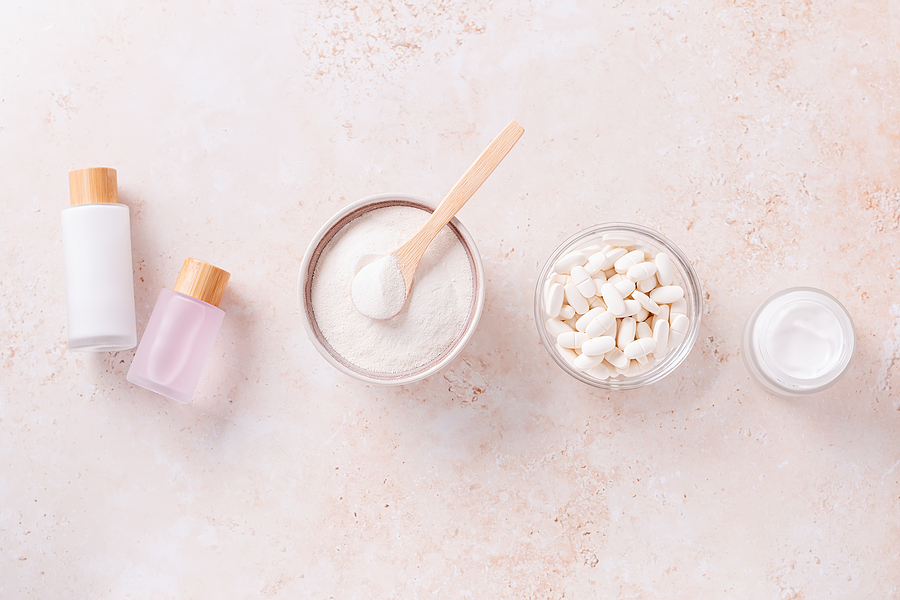What is Collagen, and what is it good for?
Collagen is a structural protein that provides strength and elasticity to skin, hair, nails, and connective tissues throughout the body.
As we age, collagen production naturally declines, leading to signs of aging like wrinkles and joint pain, which is why many people turn to supplements to maintain skin health and joint functionality.
What are the best food sources of collagen?
Collagen is a protein that is naturally found in various animal-based foods. Therefore, the best food sources of collagen are:
- Bone Broth: Bone broth is made by simmering animal bones and connective tissue, which are rich in collagen. Drinking bone broth regularly can help boost your collagen intake.
- Chicken: Chicken is a good source of collagen, especially in the form of its skin and cartilage.
- Fish: Fish, especially cold-water fish such as salmon and tuna, are excellent sources of collagen. Fish skin is a particularly good source of collagen.
- Beef: Beef, particularly cuts that are high in connective tissue, such as shanks and short ribs, are good sources of collagen.
- Pork: Pork, including its skin, is a good source of collagen.
- Egg whites: Egg whites contain a protein called proline, which is a key component of collagen.
- Gelatin: Gelatin is derived from collagen and can be found in various forms, including in desserts, gummies, and supplements.
Incorporating these collagen-rich foods into your diet can help boost your body’s collagen production and support overall health and wellness.
Are there benefits to taking collagen supplements?

Different types of collagen for skin care. Collagen in powder, in tablets, in moisturiser, in serum
Collagen supplements have become increasingly popular in recent years, with many people seeking to improve the appearance of their skin, reduce joint pain, and support overall health and wellness. But what exactly is collagen, and what is it good for?
In simple terms, collagen is a complex protein made up of amino acids, including glycine, proline, and hydroxyproline. It is the most abundant protein in the human body, comprising up to 30% of our total protein mass. Collagen is found in many parts of the body, including the skin, bones, cartilage, tendons, and ligaments.
Collagen supplements are typically derived from animal sources, such as cow or fish. They come in various forms, including powders, capsules, and drinks. Some collagen supplements also contain other ingredients, such as vitamins and minerals, to enhance their effectiveness.
Here are some of the potential benefits of taking collagen supplements:
- Improves Skin Health: Collagen supplements have been shown to improve skin health by increasing skin hydration, elasticity, and firmness. Studies have also found that collagen supplements may reduce the appearance of wrinkles and fine lines.
- Reduces Joint Pain: Collagen supplements may help reduce joint pain by improving joint mobility and reducing inflammation. Several studies have found that collagen supplements may be effective in reducing symptoms of osteoarthritis and other joint-related conditions.
- Boosts Muscle Mass: Collagen is a vital component of muscle tissue. Studies have found that collagen supplements may increase muscle mass and strength, especially in older adults who are at risk of losing muscle mass.
- Supports Gut Health: Collagen supplements may help improve gut health by promoting the growth of beneficial gut bacteria and healing the lining of the digestive tract.
- Promotes Heart Health: Collagen is a key component of the arteries, which are responsible for carrying blood to and from the heart. Some studies have found that collagen supplements may help improve artery health and reduce the risk of heart disease.
Overall, collagen is an important protein that plays a vital role in the health and function of our bodies. While more research is needed to fully understand the benefits of collagen supplements, they may offer a natural way to support skin health, joint health, and overall wellness.
Additionally, collagen supplements may not be suitable for everyone, especially those with allergies to collagen sources or certain medical conditions. It’s always a good idea to consult with a healthcare professional before starting any new supplements.
Read more:
Disclaimer
All content on Silversurfers.com is provided for general information only, and should not be treated at all as a substitute for the medical advice of your own doctor or any other health care professional. Silverhairs.com will not be responsible or liable for any diagnosis made by a user based on the content on www.silversurfers.com and we are also not liable for the content of any external websites or links from or to Silverhairs to any other websites. Please always consult your own doctor if you’re in any way concerned about any aspect of your health.
Latest posts by Sally - Silversurfer's Editor (see all)
- Peter’s Gardening Tips for the month of April - March 31, 2025
- Stronger bones after 50: How to ensure you’re getting enough calcium - March 28, 2025
- Do you refer to it as Mothering Sunday or Mother’s Day? - March 27, 2025
- Embark on a SixStar Cruise - March 26, 2025
- Do you support the 2.8% pay rise for MPs? - March 25, 2025




















